日语精读第五册课文翻译
精读5第二版课文翻译
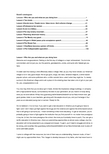
Book5 cataloguesLesson 1Who Are you and what are you doing here (1)Lesson 2 Two kinds (10)Lesson 3Goods move. People move. Ideas move. And cultures change (21)Lesson 4Professions foe women (29)Lesson 5Love is a fallacy (34)Lesson 6The way torainy mountain (47)Lesson 7Rewriting American history (53)Lesson 8 The Merely very good (73)Lesson 9 Al gore’s Nobel peace prize acceptance speech (82)Lesson10The Bluest Eye (89)Lesson 11HowNews becomes opinion off-limits (101)Lesson 12The Indispensable opposition (105)Lesson 1 Who Are you and what are you doing hereWelcome and congratulations: Getting to the first day of college is a major achievement. You’re to be commended, and not just you, but the parents, grandparents, uncles, and aunts who helped get you here.It’s been said that raising a child effectively takes a village: Well, as you may have noticed, our American village is not in very good shape. We’ve go t guns, drugs, two wars, fanatical religions, a slime-based popular culture, and some politicians who—a little restraint here—aren’t what they might be. To merely survive in this American village and to win a place in the entering class has taken a lot of grit on your part. So, yes, congratulations to all.You now may think that you’ve about got it made. Amidst the impressive college buildings, in company with a high-powered faculty, surrounded by the best of your generation, all you need is to keep doing what you’ve done before: W/b436ae4d256db091cd1ac78ea.htmlork hard, get good grades, listen to your teachers, get along with the people around you, and you’ll emerge in four years as an educated young man or woman. Ready for life.Do not believe it. It is not true. If you want to get a real education in America you’re going to have to fight—and I don’t mean just fight against the drugs and the violence and against the slime-based culture that is still going to surround you. I mean som ething a little more disturbing. To get an education, you’re probably going to have to fight against the institution that you find yourself in—no matter how prestigious it may be. (In fact, the more prestigious the school, the more you’ll probably have to push.) You can get a terrific education in America now—there are astonishing opportunities at almost every college—but the education will not be presented to you wrapped and bowed. To get it, you’ll need to struggle and strive, to be strong, and occa/b436ae4d256db091cd1ac78ea.htmlsionally even to piss off some admirable people.I came to college with few resources, but one of them was an understanding, however crude, of how I might use my opportunities there. This I began to develop because of my father, who had never been tocollege—in fact, he’d barely gotten out of high school. One night after dinner, he and I were sitting in our kitchen at 58 Clewley Road in Medford, Massachusetts, hatching plans about the rest of my life. Iwas about to go off to college, a feat no one in my family had accomplished in living memory. “I think I might want to be pre-law,” I told my father. I had no idea what being pre-law was. My father compressed his brow and blew twin streams of smoke, dragon-lik e, from his magnificent nose. “Do you want to be a lawyer?” he asked. My father had some experience with lawyers, and with policemen, too; he was not well-disposed toward either. “I’m not really sure,” I toldh/b436ae4d256db091cd1ac78ea.htmlim, “but lawyers make pretty good money, right?”My father detonated. (That was not uncommon. My father detonated a lot.) He told me that I was going to go to college only once, and that while I was there I had better study what I wanted. He said that when rich kids went to school, they majored in the subjects that interested them, and that my younger brother Philip and I were as good as any rich kids. (We were rich kids minus the money.) Wasn’t I interested in literature? I confessed that I was. Then I had better study literature, unless I had inside information to the effect that reincarnation wasn’t just hype, and I’d be able to attend college thirty or forty times. If I had such info, pre-law would be fine, and maybe even a tour through invertebrate biology could also be tossed in. But until I had the reincarnation stuff from a solid source, I better get to work and pick out some English classes from the course catalog./b436ae4d256db091cd1ac78ea.html “How about the science requirements?”“Take ’em later,” he said, “you never know.”My father, Wright AukenheadEdmundson, Malden High School Class of 1948 (by a hair), knew the score. What he told me that evening at the Clewley Road kitchen table was true in itself, and it also contains the germ of an idea about what a university education should be. But apparently almost everyone else—students, teachers, and trustees and parents—sees the matter much differently. They have it wrong.Education has one salient enemy in present-day America, and that enemy is education—university education in particular. To almost everyone, university education is a means to an end. For students, that end is a good job. Students want the credentials that will help them get ahead. They want the certificate that will give them access to Wall Street, or entrance into law or medical or business school. And how can we blame them? /b436ae4d256db091cd1ac78ea.htmlAmerica values power and money, big players with big bucks. When we raise our children, we tell them in multiple ways that what we want most forthem is success—material success. To be poor in America is to be a failure—it’s to be without decent health care, without basic necessities, often without dignity. Then there are those back-breaking student loans—people leave school as servants, indentured to pay massive bills, so that first job better be a good one. Students come to college with the goal of a diploma in mind—what happens in between, especially in classrooms, is often of no deep and determining interest to them.In college, life is elsewhere. Life is at parties, at clubs, in music, with friends, in sports. Life is what celebrities have. The idea that the courses you take should be the primary objective of going to college is tacitly considered absurd. In terms of their work, students live in the futureand/b436ae4d256db091cd1ac78ea.html not the present; they live with their prospects for success. If universities stopped issuing credentials, half of the clients would be gone by tomorrow morning, with the remainder following fast behind.The faculty, too, is often absent: Their real lives are also elsewhere. Like most of their students, they aim to get on. The work they are compelled to do to advance—get tenure, promotion, raises, outside offers—is, broadly speaking, scholarly work. No matter what anyone says this work has precious little to do with the fundamentals of teaching. The proof is that virtually no undergraduate students can read and understand their professors’ scholarly publications. The public senses this disparity and so thinks of the professors’ work as being silly or beside the point. Some of it is. But the public also senses that bec ause professors don’t pay full-bore attention to teaching they don’t have to work very hard—they’ve created /b436ae4d256db091cd1ac78ea.htmla massive feather bed for themselves and called it a university.This is radically false. Ambitious professors, the ones who, like their students, want to get ahead in America, work furiously. Scholarship, even if pretentious and almost unreadable, is nonethelesslabor-intense. One can slave for a year or two on a single article for publication in this or that refereed journal. These essays are honest: Their footnotes reflect real reading, real assimilation, and real dedication. Shoddy work—in which the author cheats, cuts corners, copies from others—is quickly detected. The people who do this work have highly developed intellectual powers, and they push themselves hard to reach a certain standard: That the results have almost nopractical relevance to the students, the public, or even, frequently, to other scholars is a central element in the tragicomedy that is often academia.The students and the profes/b436ae4d256db091cd1ac78ea.htmlsors have made a deal: Neither of them has to throw himself heart and soul into what happens in the classroom. The students write their abstract, over-intellectualized essays; the professors grade the students for their capacity to be abstract and over-intellectual—and often genuinely smart. For their essays can be brilliant, in a chilly way; they can also be clipped off the Internet, and often are. Whatever the case, no one wants to invest too much in them—for life is elsewhere. The professor saves his energies for the profession, while the student saves his for friends, social life, volunteer work, making connections, and getting in position to clasp hands on the true grail, the first job.No one in this picture is evil; no one is criminally irresponsible. It’s just that smart people are prone to look into matters to see how they might go about buttering their toast. Then they butter their toast.As for the admin/b436ae4d256db091cd1ac78ea.htmlistrators, their relation to the students often seems based not on love but fear. Administrators fear bad publicity, scandal, and dissatisfaction on the part of their customers. More than anything else, though, they fear lawsuits. Throwing a student out of college, for this or that piece of bad behavior, is very difficult, almost impossible.The student will sue your eyes out. One kid I knew (and rather liked) threatened on his blog to mince his dear and esteemed professor (me) with a samurai sword for the crime of having taught a boring class. (The class was a little boring—I had a damned cold—but the punishment seemed a bit severe.) The dean of students laughed lightly when I suggested that this behavior might be grounds for sending the student on a brief vacation. I was, you might say, discomfited, and showed up to class for a while with my cellphone jiggered to dial 911 with one touch.Still, this was small potatoes. Co/b436ae4d256db091cd1ac78ea.htmllleges are even leery of disciplining guys who have committed sexual assault, or assault plain and simple. Instead of being punished, these guys frequently stay around, strolling the quad and swilling the libations, an affront (and sometimes a terror) to their victims.You’ll find that cheating is common as well. As far as I can discern, the student ethos goes like this: If the professor is so lazy that he gives the same test every year,it’s okay to go ahead a nd take advantage—you’ve both got better things to do. The Internet is amok with services selling term papers and those services exist, capitalism being what it is, because people purchase the papers—lots of them. Fraternity files bulge with old tests from a variety of courses.Periodically the public gets exercised about this situation, and there are articles in the national news. But then interest dwindles and matters go back to normal.On/b436ae4d256db091cd1ac78ea.htmle of the reasons professors sometimes look the other way when they sense cheating is that it sends them into a world of sorrow. A friend of mine had the temerity to detect cheating on the part of a kid who was the nephew of a well-placed official in an Arab government complexly aligned with the U.S. Black limousines pulled up in front of his office and disgorged decorously suited negotiators. Did my pal fold? Nope, he’s not the type. But he did not enjoy the process.What colleges generally want are well-rounded students, civic leaders, people who know what the system demands, how to keep matters light, not push too hard for an education or anything else; people who get their credentials and leave the professors alone to do their brilliant work, so they may rise and enhance the rankings of the university. Such students leave and become donors and so, in their own turn, contribute immeasurably to the university’s standing.T/b436ae4d256db091cd1ac78ea.htmlhey’ve done a fine job skating on surfaces in high school—the best way to get an across-the-board outstanding record—and now they’re on campus to cut a few more figure eights.In a culture where the major and determining values are monetary, what else could you do? How else would you live if not by getting all you can, succeeding all you can, making all you can?The idea that a university education really should have no substantial content, should not be about what John Keats was disposed to call Soul-making, is one that you might think professors and university presidents would be discreet about. Not so. This view informed an address that Richard Brodhead gaveto the senior class at Yale before he departed to become president of Duke. Brodhead, an impressive, articulate man, seems to take as his e ducational touchstone the Duke of Wellington’s precept that the Battle of Waterloo was won on the playing fields ofEto/b436ae4d256db091cd1ac78ea.htmln. Brodhead suggests that the content of the courses isn’t really what matters. In five years (or five months,or minutes), the student is likely to have forgotten how to do the problem sets and will only hazily recollect what happens in the ninth book of Paradise Lost. The legacy of their college years will be a legacy of difficulties overcome. When they face equally arduous tasks later in life, students will tap their old resources of determination, and they’ll win.All right, there’s nothing wrong with this as far as it goes—after all, the student who writes a brilliant forty-page thesis in a hard week has learned more than a little about her inner resources. Maybe it will give her needed confidence in the future. But doesn’t the content of the courses matter at all?On the evidence of this talk, no. Trying to figure out whether the stuff you’re reading is true or false and being open to having your lif/b436ae4d256db091cd1ac78ea.htmle changed is a fraught, controversial activity. Doing so requires energy from the professor—which is better spent on other matters. This kind of perspective-altering teaching and learning can cause the things which administrators fear above all else: trouble, arguments, bad press, etc. After the kid-samurai episode, the chair of my department not unsympathetically suggested that this was the sort of incident that could happen when you brought a certain intensity to teaching. At the time I found his remark a tad detached, but maybe he was right.So, if you want an education, the odds aren’t with you: The professors are off doing what t hey call their own work; the other students, who’ve doped out the way the place runs, are busy leaving the professors alone and getting themselves in position for bright and shining futures; the student-services people are trying to keep everyone content, offering plenty of entertainment andbu/b436ae4d256db091cd1ac78ea.htmlilding another state-of-the-art workout facility every few months. The development office is already scanning you for future donations. The primary function of Yal e University, it’s recently been said, is to create prosperous alumni so as to enrich Yale University.So why make trouble? Why not just go along? Let the profs roam free in the realms of pure thought, let yourselves party in the realms of impure pleasure, and let the student-services gang assert fewer prohibitions and newer delights for you. You’ll get a good job, you’ll have plenty of friends, you’ll have a driveway of your own.You’ll also, if my father and I are right, be truly and righteously screw ed. The reason for this is simple. The quest at the center of a liberal-arts education is not a luxury quest; it’s a necessity quest. If you do not undertake it, you risk leading a life of desperation—maybe quiet, maybe, in time, very loud—and I/b436ae4d256db091cd1ac78ea.htmlam not exaggerating. For you risk trying to be someone other than who you are, which, in the long run, is killing.By the time you come to college, you will have been told who you are numberless times. Your parents and friends, your teachers, your counselors, your priests and rabbis and ministers and imams have all had their say. They’ve let you know how they size you up, and they’ve let you know what they think you should value. They’ve given you a sharp and pro tracted taste of what they feel is good and bad, right and wrong. Much is on their side. They have confronted you with scriptures—holy books that, whatever their actual provenance, have given people what they feel to be wisdom for thousands of years. They’ve given you family traditions—you’ve learned the ways of your tribe and your community. And, too, you’ve been tested, probed, looked at up and down and through. The coach knows what your athletic prospects are, th/b436ae4d256db091cd1ac78ea.htmle guidance office has a sheaf of test scores that relegate you to this or that ability quadrant, and your teachers have got you pegged. You are, as Foucault might say, the intersection of many evaluative and potentially determining discourses: you boy, you girl, have been made.And—contra Foucault—that’s not so bad. Embedded in all of the major religions are profound truths. Schopenhauer, who despised belief in transcendent things, nonetheless thought Christianity to be of inexpressible worth. He couldn’t believe in the divinity of Jesus, or in the afterlife, but to Schopenhauer, a deep pessimist, a religion that had as its central emblem the figure of a man being tortured on a cross couldn’t be entirely misleading. To the Christian, Schopenhaue r said, pain was at the center of the understanding of life, and that was just as it should be.One does not need to be as harsh as Schopenhauer to understand the use ofrel/b436ae4d256db091cd1ac78ea.htmligion, even if one does not believe in an otherworldly god. And all of those teachers and counselors and friends—and the prognosticating uncles, the dithering aunts, the fathers and mothers with their hopes for your fulfillment—or theirfulfillment in you—should not necessarily be cast aside or ignored. Families have their wisdom. The question “Who do they think you are at home?” is never an idle one.The major conservative thinkers have always been very serious about what goes by the name of common sense. Edmund Burke saw common sense as a loosely made, but often profound, collective work, in which humanity has deposited its hard-earned wisdom—the precipitate of joy and tears—over time. You have been raised in proximity to common sense, if you’ve been raised at all, and common sense is something to respect, though not quite—peace unto the formidable Burke—to revere.You may be all that the good people who/b436ae4d256db091cd1ac78ea.html raised you say you are; you may want all they have shown you is worth wanting; you may be someone who is truly your father’s son or your mother’s daughter. But then again, you may not be.For the power that is in you, as Emerson suggested, may be new in nature. You may not be the person that your parents take you to be. And—this thought is both more exciting and more dangerous—you may not be the person that you take yourself to be, either. You may not have read yourself aright, and collegeis the place where you can find out whether you have or not. The reason to read Blake and Dickinson and Freud and Dickens is not to become more cultivated, or more articulate, or to be someone who, at a cocktail party, is never embarrassed (or who can embarrass others). The best reason to read them is to see if they may know you better than you know yourself. You may find your own suppressed and rejected thoughts flowing back to you with/b436ae4d256db091cd1ac78ea.html an “alienated majesty.” Reading the great writers, you may have the experience that Longinus associated with the sublime: You feel that you have actually created the text yourself. For somehow your predecessors are more yourself than you are.This was my own experience reading the two writers who have influenced me the most, Sigmund Freud and Ralph Waldo Emerson. They gave words to thoughts and feelings that I had never been able to render myself. They shone a light onto the world and what they saw, suddenly I saw, too. From Emerson I learned to trust my own thoughts, to trust them even when every voice seems to be on the other side. I need the wherewithal, as Emerson did, to say what’s on my mind and to take theinevitable hits. Much more I learned from the sage—about character, about loss, about joy, about writing and its secret sources, but Emerson most centrally preaches the gospel of self-reliance and that is/b436ae4d256db091cd1ac78ea.html what I have tried most to take from him. I continue to hold in mind one of Emerson’s most memorable passages: “Society is a joint-stock company, in which the members agree, for the better securing of his bread to each shareholder, to surrender the liberty and culture of the eater. The virtue in most request is conformity. Self-reliance is its aversion. It loves not realities and creators, but names and customs.”Emerson’s greatness lies not only in showing you how powerful names and customs can be, but also in demonstrating how exhilarating it is to buck them. When he came to Harvard to talk about religion, he shocked the professors and students by challenging the divinity of Jesus and the truth of his miracles. He wasn’t invited back for decades.From Freud I found a great deal to ponder as well. I don’t mean Freud the aspiring scientist, but the Freud who was a speculative essayist and interpreter of the humanc/b436ae4d256db091cd1ac78ea.htmlondition like Emerson. Freud challenges nearly every significant human ideal. He goes after religion. He says that it comes down to the longing for the father. He goes after love. He calls it “the overestimation of the erotic object.” He attacks our desire for charismatic popular leaders. We’re drawn to them because we hunger for absolute authority. He declares that dreams don’t predict the future and that there’s nothing benevolent about them. They’re disguised fulfillments of repressed wishes.Freud has something challenging and provoking to say about virtually every human aspiration. I learned that if I wanted to affirm any consequential ideal, I had to talk my way past Freud. He was—and is—a perpetual challenge and goad.Never has there been a more shrewd and imaginative cartographer of the psyche. His separation of the self into three parts, and his sense of the fraught, anxious, but often negotiablerelations/b436ae4d256db091cd1ac78ea.html among them (negotiable when youcome to the game with a Freudian knowledge), does a great deal to help one navigate experience. (Though sometimes—and this I owe to Emerson—it seems right to let the psyche fall into civil war, accepting barrages of anxiety and grief for this or that good reason.)The battle is to make such writers one’s ow n, to winnow them out and to find their essential truths. We need to see where they fall short and where they exceed the mark, and then to develop them a little, as the ideas themselves, one comes to see, actually developed others. (Both Emerson and Freud live out of Shakespeare—but only a giant can be truly influenced by Shakespeare.) In reading, I continue to look for one thing—to be influenced, to learn something new, to be thrown off my course and onto another, better way.My father knew that he was dissatisfied with life. He knew that none of the descriptions people had for h/b436ae4d256db091cd1ac78ea.htmlim quite fit. He understood that he was always out-of-joint with life as it was. He had talent: My brother and I each got about half the raw ability he possessed and that’s taken us through life well enough. But what to do with that talent—there was the rub for my father. He used to stroll through the house intoning his favorite line from Groucho Marx’s ditty “Whatever it is, I’m against it.” (I recently asked my son, now twenty-one, if he thought I was mistaken in teaching him this particular song when he was six years old. “No!” he said, filling the air with an invisible forest of exclamation points.) But what my father never managed to get was a sense of who he might become. He never had a world of possibilities spread before him, never made sustained contact with the best that had been thought and said. He didn’t get to revise his understanding of himself, figure out what he’d do best that might give the world some profit.:///b436ae4d256db091cd1ac78ea.htmlarMy father was a gruff man, but also a generous one, so that night at the kitchen table at 58 Clewley Road he made an effort to let me have the chance that had been denied to him by both fate and character. He gave me the chance to see what I was all about, and if it proved to be different from him, proved even to be something he didn’t like or entirely comprehend, then he’d deal with it.Right now, if you’re going to get a real education, you may have to be aggressive and assertive.Your professors will give you some fine books to read, and they’ll probably help you understand them. What they won’t do, for reasons that perplex me, is to ask you if the books c ontain truths you could live your lives by. When you read Plato, you’ll probably learn about his metaphysics and his politics and his way of conceiving thesoul. But no one will ask you if his ideas are good enough to believe in. No one will askyo/b436ae4d256db091cd1ac78ea.htmlu, in the words of Emerson’s disciple William James, what their “cash value” might be. No one will suggest that you might use Plato as your bible for a week or a year or longer. No one, in short, will ask you to use Plato to help you change your life.That will be up to you. You must put the question of Plato to yourself. You must ask whether reason should always rule the passions, philosophers should always rule the state, and poets should inevitably be banished from a just commonwealth. You have to ask yourself if wildly expressive music (rock and rapand the rest) deranges the soul in ways that are destructive to its health. You must inquire of yourself if balanced calm is the most desirable human state.Occasionally—for you will need some help in fleshing-out the answers—you may have to prod your professors to see if they take the text at hand—in this case the divine and disturbing Plato—to be true. And you wil/b436ae4d256db091cd1ac78ea.htmll have to be tough if the professor mocks you for uttering a sincere question instead of keeping matters easy for all concerned by staying detached and analytical. (Detached analysis has a place—but, in the end, you’ve got to speak from the heart and pose the question of truth.) You’ll be the one who pesters his teachers. You’ll ask your history teacher about whether there is a design to our history, whether we’re progressing or declining, or whether, in the words of a fine recent play, The History Boys, history’s “just one fuckin’ thing after another.” You’ll be the one who challenges your biology teacher about the intellectual conflict between evolution and creationist thinking. You’ll not only question the statistics teacher about what numbers ca n explain but what they can’t.Because every subject you study is a language and since you may adopt one of these languages as your own, you’ll want to know how to speak itexper/b436ae4d256db091cd1ac78ea.htmltly and also how it fails to deal with those concerns for which it has no adequate words. You’ll be looking into the reach of every metaphor that every discipline offers, and you’ll be trying to see around their corners.The whole business is scary, of course. What if you arrive at college devoted to pre-med, sure that nothing will make you and your family happier than a life as a physician, only to discover that elementary-school teaching is where your heart is?You might learn that you’re not meant to be a doctor at all. Of c ourse, given your intellect and discipline, you can still probably be one. You can pound your round peg through the very square hole of medical school, then go off into the profession. And society will help you. Society has a cornucopia of resources to enc ourage you in doing what society needs done but that you don’t much like doing and are not cut out to do. To ease your grief, society offer/b436ae4d256db091cd1ac78ea.htmls alcohol, television, drugs, divorce, and buying, buying, buyi ng what you don’t need. But all those too have their costs.Education is about finding out what form of work for you is close to being play—work you do so easily that it restores you as you go. Randall Jarrell once said that if he were a rich man, he would pay money to teach poetry to students. (I would, too, for what it’s worth.) In saying that, he (like my father) hinted in the direction of a profound and true theory of learning.。
日语精读课文译文

第一课这里有一份某电视台进行的第十次当代人的语言环境调查报告,第一个问题是“您认为现在人们使用的日语真的很乱吗?”对此认为是“非常乱,或者是多少有些乱”的人占全体受访人数的84%。
与此相比大上回1979年进行的调查结果是72%,而那之后的上次也就是1986年的结果是77%。
也就是说认为日语“乱”并这样回答的人在逐次增多啊。
根据不同年龄层来看结果的话,三十多岁的人时所占比例最大的。
其中有90%的人都感到日语较乱。
接着是比例为86%的四十年龄段的人,88%的五十年龄段的人。
三十岁四十岁、五十岁年龄段的比率高,其前后呈现偏低形态。
所以就成了这样一个图形。
也就是说,在一个公司里三十多岁的人会觉得二十多岁的同事的说话方式不可理解。
四十五十多岁的人也会这样,同时他们还觉得孩子们说话杂乱无章。
因此可以推测出这三个年龄段的人们对日语使用混乱的意识很强。
无论什么时候,首先受到责难的都是年轻人。
大家普遍认为日语用词杂乱几乎就等同于年轻人用词的杂乱。
那么现在的年轻人究竟是怎样的用词,怎样的说话方式呢。
对此一高中生和大学生为对象进行了调查,结果发现了很多年轻人用语。
第一次听到了“”这个词。
我想大概是抑郁、心情不好的意思。
“”是脸色黑的意思。
他们会像这样说话“”。
所说的“”是指在黑色头发或茶色头发中间有选择的挑选几缕头发染成金色。
“”指的不是单纯的漂亮,主要是指男孩子参加日照沙龙接受适度的日光浴,全身肌肉紧绷态,还要佩戴名牌首饰,身着名牌衣物并能够呈现出很好的效果。
正如大家所知道的那样,年轻人用于中有很多表达感情的用语,我们经常听到的“”是非常恶心的意思。
还有人说“”或是“”,是指郁闷,麻烦。
而“”是指非常生气要崩溃了的意思。
像这类的年轻人用语像机关枪开火似地接连不断的出现。
除此之外还有“”“”这类语音语调单调化,“”“”等的无“”形式,另外,最近也经常能听到的在句子中间发问那样的音调上挑,也就是所谓的“”。
有位学者说:“年轻人用语是为了娱乐大众和促进双方交谈的顺利进展才被广泛使用的。
综合日语第5册第4课翻译

庭院所谓的庭院就是位于房屋外部,毫不影响室内气氛的住所装置。
例如,在起居室坐着,不经意朝外面看的时候,通过那里的无论是清新宽广的草地,还是枝繁叶茂的松树其住所的氛围都会十分不同。
因为我住的是建有庭院的父母的房子,虽然称不上是自己的庭院,但可以从床边的餐桌那里观望父母的庭院。
这个院子不是按照“庭院”风格整修出来的,杂木丛生。
但这反而敏锐的反应出四季时时的变换而令人喜欢。
初春墙角出其不意的点缀着纤细的梅树,光秃秃的树枝把冬日的落日撕得四分五裂。
望着这些经常会让我焦躁的心情变得平和起来。
观赏庭院这个毫不起眼的行为,似乎是包括我在内的日本人日常生活流程中意想不到的重要环节。
例如山口瞳的极其悲伤地私小说集《庭院的沙场》之中的一篇同名短片小说就是其中一个典型的例子。
这个小说是这样写的:“今年的梅雨格外的长。
可能是三月和四月的雨天特别多的原因吧!我带着这种阴郁,的心情度过这每一天。
我并不讨厌梅雨时期,可能是因为繁茂的树木吧。
看着雨水落在绿叶繁茂的树木上感觉心情十分好。
我喜欢八仙花,紫朱那种淡淡的粉色开花时也很好看。
我坐在能近看树木的卧室的长椅子上看着下着雨的庭院。
心情开始沉重起来。
“作为作者分身的主人公在望着这样的庭院时就会开始缅怀最近一个个去世的亲人。
也就是说心情变得越来越沉重了。
或许这和先前说道的“心情平和”是相反的吧。
因为实际上平时强忍的情感在凝视庭院的时候就会被诱发出来,通过引起一种放电使得压抑消除,在本质上是和“平和”一样的现象。
在缅怀死者后到浴室洗头的主人公在葬礼上绝不哭泣去在这个时候流下了眼泪,通过结局我们可以清楚的发现都这一点。
想来,庭院的一大用途就在于有这样的治愈效果吧。
因此,最低的要求就是连接着住所,哪怕是不那么美或是没有赏心悦目的景色,足以接纳我的视线,存在着自然的断片。
看着庭院能心情平和是因为这些事自然的东西,即使只是断片,但它与人们日常生活中的偶然发生的喜怒哀乐是想独立的,保持着自己的节奏而变化着。
(最新整理)日语综合教程第五册课后练习翻译题答案和部分本文翻译
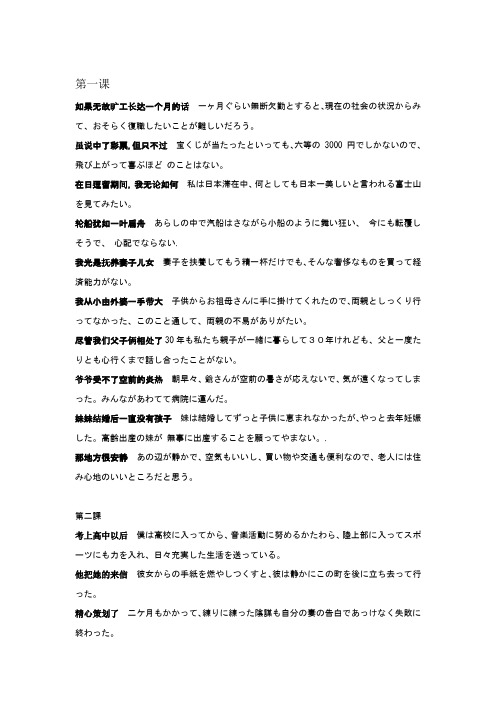
第一课如果无故旷工长达一个月的话一ヶ月ぐらい無断欠勤とすると、現在の社会の状況からみて、おそらく復職したいことが難しいだろう。
虽说中了彩票,但只不过宝くじが当たったといっても、六等の 3000 円でしかないので、飛び上がって喜ぶほどのことはない。
在日逗留期间,我无论如何私は日本滞在中、何としても日本一美しいと言われる富士山を見てみたい。
轮船犹如一叶扁舟あらしの中で汽船はさながら小船のように舞い狂い、今にも転覆しそうで、心配でならない.我光是抚养妻子儿女妻子を扶養してもう精一杯だけでも、そんな奢侈なものを買って経済能力がない。
我从小由外婆一手带大子供からお祖母さんに手に掛けてくれたので、両親としっくり行ってなかった、このこと通して、両親の不易がありがたい。
尽管我们父子俩相处了30年も私たち親子が一緒に暮らして30年けれども、父と一度たりとも心行くまで話し合ったことがない。
爷爷受不了空前的炎热朝早々、爺さんが空前の暑さが応えないで、気が遠くなってしまった。
みんながあわてて病院に運んだ。
妹妹结婚后一直没有孩子妹は結婚してずっと子供に恵まれなかったが、やっと去年妊娠した。
高齢出産の妹が無事に出産することを願ってやまない。
.那地方很安静あの辺が静かで、空気もいいし、買い物や交通も便利なので、老人には住み心地のいいところだと思う。
第二課考上高中以后僕は高校に入ってから、音楽活動に努めるかたわら、陸上部に入ってスポーツにも力を入れ、日々充実した生活を送っている。
他把她的来信彼女からの手紙を燃やしつくすと、彼は静かにこの町を後に立ち去って行った。
精心策划了二ケ月もかかって、練りに練った陰謀も自分の妻の告白であっけなく失敗に終わった。
那个村庄有一对ある村に老夫婦がいて、一人娘をはなはだ可愛がっていたが、その娘は十五六歳で病で死んでしまった。
以来ずっと老夫婦は朝から晩まで悲しみに暮れ、もう目も当てられぬ有様だった。
高级日语第五册课后题翻译

(1)鉴真是中国鑑真は中国の唐の名僧であり、唐の文化を日本に伝え、日本で仏教を布教させた者でもある。
(2)公元732年西暦七三二年、栄叡と普照という二人の日本僧は、戒を授ける資格のある名僧を見つけるために、はるばる海をわたって唐に来た。
その後、やっと鑑真に会って日本へ来てださるようにと、頼んだ鑑真は喜んで招きに応じた。
そして日本へ渡航の準備に取りかかった。
(3)然后,鉴真しかし、鑑真たちの船は二回難破したり、その渡航をねたむ弟子たちの邪魔をされたりして、あわせて五回ぐらい失敗した。
五回目は船が海南島に流れ着いて、帰途中、鑑真は失明してしまった。
(4)面对屡次失败度重なる失敗を前にして、鑑真は少しも力を落とすことなく、そして六回目の準備に取りかかった。
西暦七五二年、藤原清河は鑑真を日本へつれて帰ろうとする時、唐の玄宗皇帝に断られた。
そこで、大伴古麻呂はひそかに鑑真とその弟子を自分の船に乗せて、唐をあとにした。
(5)鉴真一行七五四年一月、鑑真一行はついに日本に着くことができた。
鑑真が何度か失敗しても志を捨てなかったのは、真の仏教を日本に伝えると言う強い信念を持っていたからである。
(6)鉴真到日本后日本に到着したあと、鑑真は奈良の東大寺で戒壇をもうけて戒を授けた。
聖武天皇をはじめ、数多くの僧たちが戒を受けた。
また、もっと多くの人々に戒律を伝授するために、鑑真は奈良で寺を建てた。
それが唐招提寺である。
(7)唐招提寺唐招提寺は奈良の右京区にあり、当時、日本各地から大勢の僧がここに集まった。
金堂と講堂は今でも当時の面影を残している。
講堂の後ろにある丘の上に開山堂という大きい建物がある。
そこに鑑真の像が祭られている(1)在一望无际的太湖見渡すかぎりの太湖の湖畔に、風車が一日中くるくると回っている。
(2)为了准备期中考试中間テストに備えて、わたしたちは週末でも休まないで、一生けん命復習している。
(3)这个问题已经もう何年も遅らせた問題なので、今度は何とかして解決しなければならない。
Gckdpo日语综合教程五六册部分课文中日对照

秋风清,秋月明,落叶聚还散,寒鸦栖复惊。
日语综合教程第五册第一课海の中に母がいる山好きの血が父方から流れているとすると、海好きは間違いなく母から伝わっている。
終戦間もなく、不忍池のほとりを通りかかると、池端に、ははがしゃがみこんで池の面をじっと見ている。
声をかけると、母は照れたような顔で立ち上げり「ちょっと海がみたくなって」と言って笑った。
当時、東大のそばに住んでいたので、買い物のついでに不忍池で休んでいたのだろうが、その時の母の言葉が妙に忘れられない。
小学六年の夏、母の故郷の鹿児島の辺鄙な漁村で一月暮らしたことがある。
母の父は背の高い、強い人で、そこでずっと医者をしていた。
家から五十メートルほどで海に出る。
桜島や開聞岳の見える美しい浜辺だった。
母が海を見たいと言ったのは、その故郷の浜辺のことを考えていたのかもしれない。
今なら二時間もかからない鹿児島は、その頃は夜行や連絡船で二日かかる遠い国だった。
望郷の思いに駆けられても当然だったような気がする。
海好きといっても、心ゆくまで海と親しんだのはその夏だけで、あとは学校から海水浴にゆく程度だった。
おそらく海と切り離された状態がかえって海への憧れを掻き立てたのだろう。
大学を出る年、なんとしても海に関係する職業につきたいと重い、日本郵船に入社できないか聞きに行った。
対応に出た人事課長は「うちも、ほかの会社と同じですよ。
文学出身では、どうもね」と気の毒がってくれた。
船会社だから、全員が船にのれるものと勘違いしていたわけだ。
それでも、船に乗って、海を思いのたけ味わいたいと言う気持ちは、いっこうに衰えなかった。
幸いフランスに行くことになり、留学生は船に乗るように、という指示があった。
マルセイユまで三十三日の船旅――考えただけでも嬉しさで気が遠くなりそうだった。
しかし仲間の留学生たちは、なんでそんな無駄なたびをさせるのか、と不満だった。
私は一人海の喜びを満喫するため、四等船室を選んだ。
日语综合教程第五册课后翻译练习

第一课1.如果无故旷工长达1个月的话,从目前这个公司的现状来看,想要复职恐怕比较困难。
(~とすると;无故旷工―無断欠勤)一ヶ月ぐらい無断欠勤とすると、現在の会社の状況からみて、おそらく復職したいことが難しいだろう。
2.虽说中了彩票,但只不过中了1个六等奖3000日元而已,没有必要高兴得跳起来。
(~といっても)宝くじに当たると言っても、三千円の六等賞が当たっているだけ、飛び上がりに喜んだことはない。
3.在日逗留期间,我无论如何也要去看看被称为日本之最的美丽的富士山。
(何としても)在日間、何としても、「日本の最」と言われて美しい富士山を見に行きます。
4.轮船犹如一叶扁舟在海浪中疯狂地飘舞着,仿佛马上就要翻船。
让人担心不已。
(~さながら;疯狂地飘舞着-舞いくるう)汽船は小船さながら波の中で舞い狂っていて、すぐに転覆そうで、心配してたまらない。
5.我光是抚养妻子儿女就已经很吃力了,根本没有经济能力去买那种奢侈品。
(~だけでも;很吃力―精いっぱい)妻子を扶養してもう精いっぱいだけでも、そんな奢侈なものを買って経済能力がない。
6.我从小由外婆一手带大,与父母不太亲近。
可是通过这件事情,我深深感受到做父母亲的不容易。
(ありがたみ;与父母不太亲近ー両親としっくり行ってなかった)子供からお祖母さんに手に掛けてくれたので、両親としっくり行ってなかった、このこと通して、両親の不易がありがたい。
7.尽管我们父子俩相处了30年,可是我从未与父亲尽情地交谈过。
(心ゆくまで;从未ー一度たりとも~ない)私たち親子が一緒に暮らして30年けれども、父と一度たりとも心行くまで話し合ったことがない。
8.爷爷受不了空前的炎热,一大清早就晕过去了。
大家七手八脚地把他送到了医院。
(気が遠くなる;七手八脚ーあわてて)朝早々、爺さんが空前の暑さが応えないで、気が遠くなってしまった。
みんながあわてて病院に運んだ。
9.妹妹结婚后一直没有孩子,去年总算怀孕了。
综合日语5 第十一课
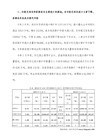
9. ちょうし(調子)を 3ごまか(誤魔化)す
10.むいちもん(無一文)に 7と(取)りし(締)まる
1. 葬送自身 2. 偏离话题 3. 蒙混 4. 训斥
5. 带去警署 6. 妨碍执行公务 7. 取缔违速 8.藏在暗处
6. カメが言うと、ウサギは( もはや )興奮ぎみで、かっかとなっていった。
7. 事は明らかだ。( いちいち )事情を認めるまでもない。
8. ウザギは( いやおなしに )警察署に連行された。
六、
1. 正解:1
2. 正解:4
七、
1. どうやら~ようだ(らしい)
例:危険な遊びはなんとなく子どもにとって( )ようだ。
e. メールなどから見て、どうやら留学の(気持ちがある )ようです。
2. 否応なしに~
例:無理に警察に( )。→否応なしに警察に(連行された)。
a. リストラで10人の社員が否応なしに( 辞めさせられた )。
b. 人手不足で否応なしに残業を( させられた )。
c. 上司からの圧力で否応なしに( 断らざるを得なかった )。
“那又怎么样?”
“你真得让人掉眼镜了。不仅脚,连脑子也慢得让人吃惊。我可以把全部财产都押在自己的输赢上。”
“你不要那么胡来!这么轻率的一句话。变得身无分文的怎么办?”
乌龟这么一说,兔子早已兴奋不已了。
“我也许是自大,但你更是夸大妄想了。需要直面现实的电休克疗法。怎么样?试试看吧。不过,你也要赌上全部财产。怎么样,怕了吧?”
→危険な遊びはどうやら子どもにとって(魅力がある)ようだ。
a. 遠くに明かりが瞬いていて、どうやら( 港に近づいた )ようだ。
日语精读翻译

第10课亲から子へと、役者が代々演技を伝えていく必要が生じるのは、そのためである。
因为那个原因需要演员,从父母到孩子将演技代代传承下去。
那样,演技本身就能确立它的传承。
这与日本的音乐啊舞蹈等的传统是相同的第十六课神耳兜帽1很久很久以前,在某个地方,有一位贫穷但善良的老爷爷。
虽然一直想给五谷神供上生鱼什么的,但是由于贫穷连那个都无法做到,有一天,他去神社参拜时这样说道。
“我由于太贫穷了,连生鱼都无法供上,请把我吃了吧,拜托了。
”(「~でござりまする」是「~です」的文语)神说道,“老爷爷,老爷爷,不必那么担心。
我知道你穷得连两顿饭都吃不上。
今天我就赐给你一个好运(「~てやんべ」是「~てやる」的文语)。
你,把这个宝贝头巾戴上。
因为,一戴上这个,从小鸟到野兽,它们所说的话无论是什么都能够听懂。
”于是就把一个陈旧的红色头巾赐给了老爷爷。
“是吗?非常感谢。
”老爷爷高兴的说道并立马收下了那个脏脏的红色帽子。
于是,老爷爷慢悠悠的逛了逛街之后,在路边大树的树根上坐了下来。
2这时(「そこへ」=>「その時」),一只鸟飞了过来。
然后,从另一个方向又飞来了一只小鸟,停在了同一个树枝上。
老爷爷看见了这番景象,想着如果要试试那顶帽子的话现在正是时候,于是他就戴上了那顶帽子(「例の」=>「その」)。
于是,竟然,头上小鸟们说的话居然能够明白(「~ではありませんか」表惊讶)!“呀,好久不见了,我曾呆在海边那里,海边最近也没什么鱼,不景气啊,日子不好过呀。
你从哪边来的?”“我从城镇那边来的。
不景气的情况,海边也好,城镇也好,都一样啊。
”它们开始了这样的谈话,然后其中一只鸟打听道,有没有什么特别的事啊?于是另一只鸟说,也没什么特别的,就是有这么一回事。
“在一个富豪的宅邸中,有一个仓库已经建好有五、六年了,在那个仓库的屋顶和柱子之间不知为何夹着一条蛇,蛇以无法动弹,如今已是半死不活了。
母蛇搬来食物,一直喂养着那条蛇,那两条蛇的劳苦长期积累,最终给富翁的女儿带来了灾祸。
综合日语5册第8课翻译
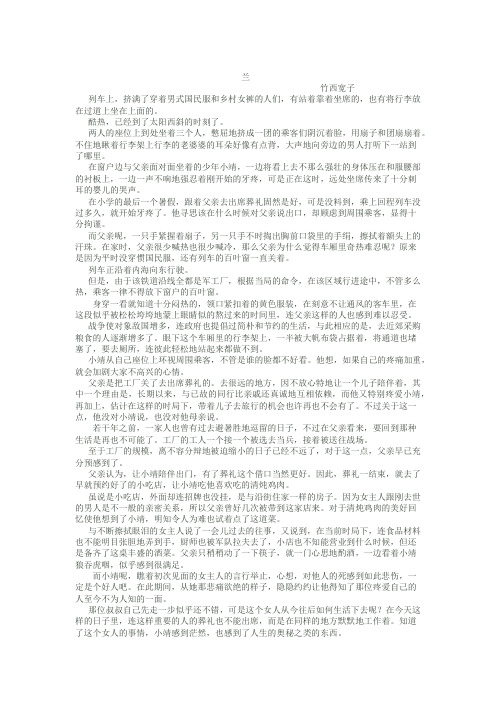
兰竹西宽子列车上,挤满了穿着男式国民服和乡村女裤的人们,有站着靠着坐席的,也有将行李放在过道上坐在上面的。
酷热,已经到了太阳西斜的时刻了。
两人的座位上到处坐着三个人,憋屈地挤成一团的乘客们阴沉着脸,用扇子和团扇扇着。
不住地瞅着行李架上行李的老婆婆的耳朵好像有点背,大声地向旁边的男人打听下一站到了哪里。
在窗户边与父亲面对面坐着的少年小靖,一边将看上去不那么强壮的身体压在和服腰部的衬板上,一边一声不响地强忍着刚开始的牙疼,可是正在这时,远处坐席传来了十分刺耳的婴儿的哭声。
在小学的最后一个暑假,跟着父亲去出席葬礼固然是好,可是没料到,乘上回程列车没过多久,就开始牙疼了。
他寻思该在什么时候对父亲说出口,却顾虑到周围乘客,显得十分拘谨。
而父亲呢,一只手紧握着扇子,另一只手不时掏出胸前口袋里的手绢,擦拭着额头上的汗珠。
在家时,父亲很少喊热也很少喊冷,那么父亲为什么觉得车厢里奇热难忍呢?原来是因为平时没穿惯国民服,还有列车的百叶窗一直关着。
列车正沿着内海向东行驶。
但是,由于该铁道沿线全都是军工厂,根据当局的命令,在该区域行进途中,不管多么热,乘客一律不得放下窗户的百叶窗。
身穿一看就知道十分闷热的,领口紧扣着的黄色服装,在刻意不让通风的客车里,在这段似乎被松松垮垮地蒙上眼睛似的熬过来的时间里,连父亲这样的人也感到难以忍受。
战争使对象敌国增多,连政府也提倡过简朴和节约的生活,与此相应的是,去近郊采购粮食的人逐渐增多了。
眼下这个车厢里的行李架上,一半被大帆布袋占据着,将通道也堵塞了,要去厕所,连彼此轻松地站起来都做不到。
小靖从自己座位上环视周围乘客,不管是谁的脸都不好看。
他想,如果自己的疼痛加重,就会加剧大家不高兴的心情。
父亲是把工厂关了去出席葬礼的。
去很远的地方,因不放心特地让一个儿子陪伴着,其中一个理由是,长期以来,与已故的同行比亲戚还真诚地互相依赖,而他又特别疼爱小靖,再加上,估计在这样的时局下,带着儿子去旅行的机会也许再也不会有了。
综合日语第五册第3课翻译

一,日常的思想报社给了我一个课题,是关于对余暇问题怎样思考而进行的哲学考察。
余暇问题开始变成逐渐重要的问题给为什么这么说呢。
这是因为随着科学的发展,生产力的提高,人们的劳动时间缩短,不管是在资本主义国家还是在社会主义国家,都是采用科学技术的现代文明史所追寻的必然方向。
倒不如说这是一件好事,因为人们从对温饱问题中解脱出来,拥有自由的时间,相比于任何事情对于人们来说都是迫切希望的。
对于以前的人们来说,自由的时间是最奢侈的东西。
因为大多数人们为了维持生存而不得不从事劳动的时候,像这样不劳动的人们,仅因为这一点,而背上罪名。
因此,从事自由精神工作的传教士自行断绝了物质欲望和性欲。
也就是将禁欲当作换取自由精神生活的代价。
在这里,闲暇完全只是少数例外者所被允许的特权。
原本人类迄今为止都是以劳动为中心的价值观生存着的,特别是拥有这样强烈价值观的近代西洋文学。
日本人彻底的贯彻这种价值观是在明治以后。
在德川时代,也有肯定评价在劳动的时候可以享乐的价值观。
但是在明治以后日本刚一决定采用西洋文化不久,日本人就树立起了以劳动为唯一的价值的一元化价值观。
这是因为日本人判断日本或者东洋文明无论如何都敌不过欧洲文明的理由是,他们还洞察到欧洲文明比起拥有强大的军事能力,还拥有更高的生产力。
在这里,日本人的洞察是没有错的。
因为欧洲的文明是把通过技术提高生产力作为文明的原理的一种文明。
日本在感到自己在欧洲诸国军事能力的压力前难以匹敌的同时,还惊讶于欧洲科学技术文明所产生的生产力。
将欧洲文明移入,建设富强的国家,是过去一百年间日本的目标。
在这样的目标中让自己全力以赴的日本,最终建设成为比欧洲还要具有欧式技术文明的国家,比欧洲诸国还要推崇技术文明这个价值观的国家。
这样的事情常常在文明落后国中发生。
在欧洲,这种文明是与传统的精神文明,特别是在基督教文明相协调而存在的。
但是在想要采用像日本,美国,俄罗斯这样落后的技术文明的国家中,这种调和不仅没有作为问题,而仅仅是作为技术文明被迫不及待的移入进去。
新编日语教程5.1到5课课文译文
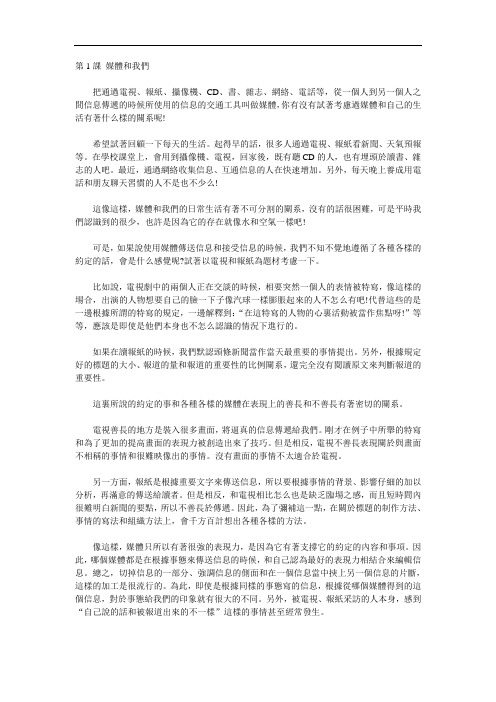
第1課媒體和我們把通過電視、報紙、攝像機、CD、書、雜志、網絡、電話等,從一個人到另一個人之間信息傳遞的時候所使用的信息的交通工具叫做媒體,你有沒有試著考慮過媒體和自己的生活有著什么樣的關系呢!希望試著回顧一下每天的生活。
起得早的話,很多人通過電視、報紙看新聞、天氣預報等。
在學校課堂上,會用到攝像機、電視,回家後,既有聽CD的人,也有埋頭於讀書、雜志的人吧。
最近,通過網絡收集信息、互通信息的人在快速增加。
另外,每天晚上養成用電話和朋友聊天習慣的人不是也不少么!這像這樣,媒體和我們的日常生活有著不可分割的關系,沒有的話很困難,可是平時我們認識到的很少,也許是因為它的存在就像水和空氣一樣吧!可是,如果說使用媒體傳送信息和接受信息的時候,我們不知不覺地遵循了各種各樣的約定的話,會是什么感覺呢?試著以電視和報紙為題材考慮一下。
比如說,電視劇中的兩個人正在交談的時候,相要突然一個人的表情被特寫,像這樣的場合,出演的人物想要自己的臉一下子像汽球一樣膨脹起來的人不怎么有吧!代替這些的是一邊根據所謂的特寫的規定,一邊解釋到:“在這特寫的人物的心裏活動被當作焦點呀!”等等,應該是即使是他們本身也不怎么認識的情況下進行的。
如果在讀報紙的時候,我們默認頭條新聞當作當天最重要的事情提出。
另外,根據規定好的標題的大小、報道的量和報道的重要性的比例關系,還完全沒有閱讀原文來判斷報道的重要性。
這裏所說的約定的事和各種各樣的媒體在表現上的善長和不善長有著密切的關系。
電視善長的地方是裝入很多畫面,將逼真的信息傳遞給我們。
剛才在例子中所舉的特寫和為了更加的提高畫面的表現力被創造出來了技巧。
但是相反,電視不善長表現關於與畫面不相稱的事情和很難映像出的事情。
沒有畫面的事情不太適合於電視。
另一方面,報紙是根據重要文字來傳送信息,所以要根據事情的背景、影響仔細的加以分析,再滿意的傳送給讀者。
但是相反,和電視相比怎么也是缺乏臨場之感,而且短時間內很難明白新聞的要點,所以不善長於傳遞。
日语精读
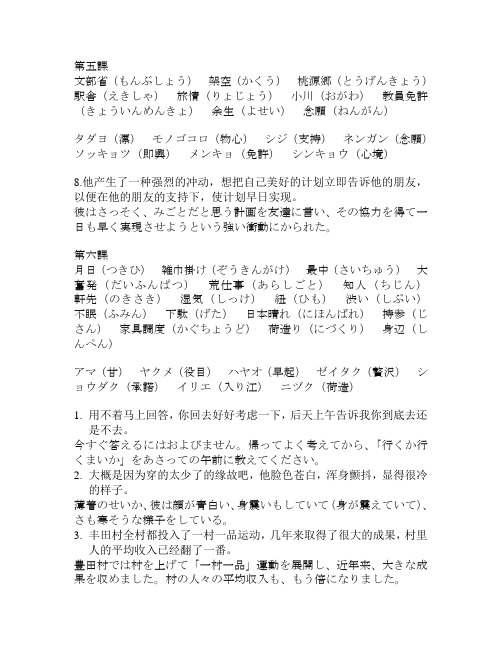
第五課文部省(もんぶしょう)架空(かくう)桃源郷(とうげんきょう)駅舎(えきしゃ)旅情(りょじょう)小川(おがわ)教員免許(きょういんめんきょ)余生(よせい)念願(ねんがん)タダヨ(漂)モノゴコロ(物心)シジ(支持)ネンガン(念願)ソッキョツ(即興)メンキョ(免許)シンキョウ(心境)8.他产生了一种强烈的冲动,想把自己美好的计划立即告诉他的朋友,以便在他的朋友的支持下,使计划早日实现。
彼はさっそく、みごとだと思う計画を友達に言い、その協力を得て一日も早く実現させようという強い衝動にかられた。
第六課月日(つきひ)雑巾掛け(ぞうきんがけ)最中(さいちゅう)大奮発(だいふんぱつ)荒仕事(あらしごと)知人(ちじん)軒先(のきさき)湿気(しっけ)紐(ひも)渋い(しぶい)不眠(ふみん)下駄(げた)日本晴れ(にほんばれ)持参(じさん)家具調度(かぐちょうど)荷造り(にづくり)身辺(しんぺん)アマ(甘)ヤクメ(役目)ハヤオ(早起)ゼイタク(贅沢)ショウダク(承諾)イリエ(入り江)ニヅク(荷造)1.用不着马上回答,你回去好好考虑一下,后天上午告诉我你到底去还是不去。
今すぐ答えるにはおよびません。
帰ってよく考えてから、「行くか行くまいか」をあさっての午前に教えてください。
2.大概是因为穿的太少了的缘故吧,他脸色苍白,浑身颤抖,显得很冷的样子。
薄着のせいか、彼は顔が青白い、身震いもしていて(身が震えていて)、さも寒そうな様子をしている。
3.丰田村全村都投入了一村一品运动,几年来取得了很大的成果,村里人的平均收入已经翻了一番。
豊田村では村を上げて「一村一品」運動を展開し、近年来、大きな成果を収めました。
村の人々の平均収入も、もう倍になりました。
10.我和他虽然已在同一个学校里工作了二三十年了,但因为是各做各的工作,平日也很少来往,所以对他的情况知道得并不多。
彼と同じ学校に勤めて、もう二三十年になりましたが、別々の仕事をしていて、平素付き合いも少くなかったですから、彼のことについてはあまり知らないんです。
综合日语5册第11课翻译

综合日语5册第11课翻译从岛上所见说起在北海道的天卖岛,我曾经有过乘着带有小型发动机的小船在小岛四周的大海上巡游。
我在小岛上的马道上散步了一圈回到民营的时候,正好碰到民营的主人带着四岁和一岁半的孙子搬出小船,他邀我也一同去乘船,虽说是爷爷,但也只是50岁左右那样年轻,他每天都会被孙子们缠着乘小船出海,在妻子和媳妇准备晚餐的繁忙时间,他承担了照顾孩子的任务。
在大海风平浪静的时候就到海上照顾孩子。
小船沿着海岸行驶,因为是小船,只有在观光船不能靠近的沿岛的浅滩中随波行走着。
数百只黑尾鸥飞起,在岩礁之间排成一列的海鱼鹰贴近海面飞翔,孩子们将手伸入乘着小船出海的海水中,并吱吱嘎嘎的喧闹着。
因为孩子们身体靠着同一边的船舷上,小船一下子倾斜着,我内心捏了把汗,如果掉入海中就麻烦了,而且我自己也很害怕,要是小船翻了的话,就会被翻卷的波浪甩到岩石上,想到这儿我抓住两个孩子的背,但是孩子们却一点也没有静下来,我真是累坏了。
但是,孩子们真的很有活力,就连天快变黑要回去的时候,还央求再多乘会儿船,他们是大海的孩子啊,这些孩子就是这样全身心的去体会大海的吧,由祖父带着去散步,总有一天他们一定会将天卖鸟四周的大海的每个角落都了解的一清二楚。
在环岛的过程中,那个四岁的孩子说那边的水很好喝,我们将小船停在海蚀岩下面,去喝洞穴里涌出来的水,小孩将附近的草叶摘下来巧妙的卷起来,去滔起据说是很久以前土著人住过的洞底而涌出的水,然后立马喝掉。
我也学着他的样子喝了一口,果然是很好喝的水,这样的水所在之处,这种喝法,都是这个四岁的小孩子从祖父那里学到的。
这些孩子将大海,尤其是天卖岛的大海肉体化了。
在大海这样的自然中,和父亲一样,和祖父一样,和曾祖父一样的东西铭刻在身体里。
将大海肉体化这一点,我连这个四岁甚至是这个一岁半的小孩都不如。
我出生成长在雪国,对于雪这个自然的话是十分肉体化的了,但是对于大海就具有洗海水浴、在海边散步这样的体验而已。
日语综合教程第五册课后练习翻译题答案
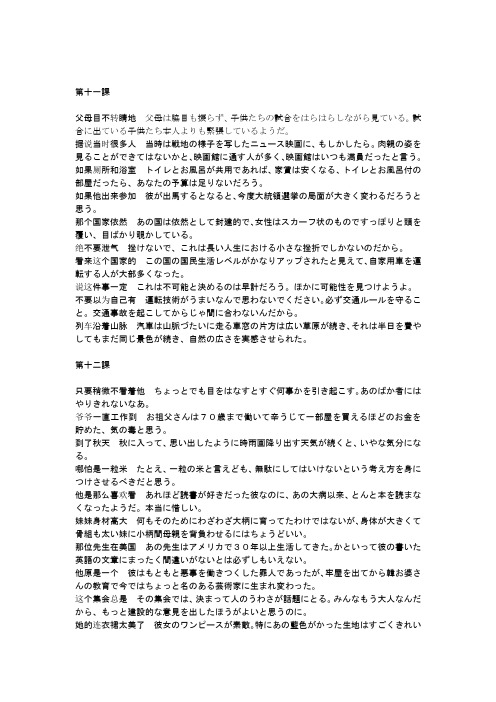
第十一課父母目不转睛地父母は脇目も振らず、子供たちの試合をはらはらしながら見ている。
試合に出ている子供たち本人よりも緊張しているようだ。
据说当时很多人当時は戦地の様子を写したニュース映画に、もしかしたら。
肉親の姿を見ることができてはないかと、映画館に通す人が多く、映画館はいつも満員だったと言う。
如果厕所和浴室トイレとお風呂が共用であれば、家賃は安くなる、トイレとお風呂付の部屋だったら、あなたの予算は足りないだろう。
如果他出来参加彼が出馬するとなると、今度大統領選挙の局面が大きく変わるだろうと思う。
那个国家依然あの国は依然として封建的で、女性はスカーフ状のものですっぽりと頭を覆い、目ばかり覗かしている。
绝不要泄气挫けないで、これは長い人生における小さな挫折でしかないのだから。
看来这个国家的この国の国民生活レベルがかなりアップされたと見えて、自家用車を運転する人が大部多くなった。
说这件事一定これは不可能と決めるのは早計だろう。
ほかに可能性を見つけようよ。
不要以为自己有運転技術がうまいなんで思わないでください。
必ず交通ルールを守ること。
交通事故を起こしてからじゃ間に合わないんだから。
列车沿着山脉汽車は山脈づたいに走る車窓の片方は広い草原が続き、それは半日を費やしてもまだ同じ景色が続き、自然の広さを実感させられた。
第十二課只要稍微不看着他ちょっとでも目をはなすとすぐ何事かを引き起こす。
あのばか者にはやりきれないなあ。
爷爷一直工作到お祖父さんは70歳まで働いて辛うじて一部屋を買えるほどのお金を貯めた、気の毒と思う。
到了秋天秋に入って、思い出したように時雨画降り出す天気が続くと、いやな気分になる。
哪怕是一粒米たとえ、一粒の米と言えども、無駄にしてはいけないという考え方を身につけさせるべきだと思う。
他是那么喜欢看あれほど読書が好きだった彼なのに、あの大病以来、とんと本を読まなくなったようだ。
本当に惜しい。
妹妹身材高大何もそのためにわざわざ大柄に育ってたわけではないが、身体が大きくて骨組も太い妹に小柄間母親を背負わせるにはちょうどいい。
综合日语第五册第一课和第四课,中文译文
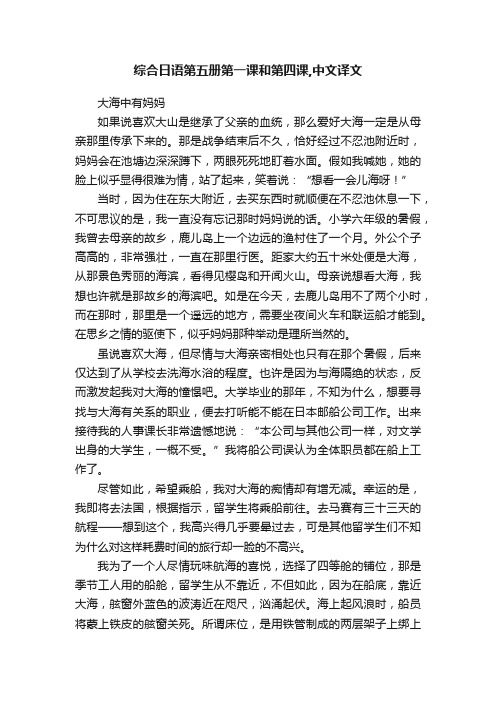
综合日语第五册第一课和第四课,中文译文大海中有妈妈如果说喜欢大山是继承了父亲的血统,那么爱好大海一定是从母亲那里传承下来的。
那是战争结束后不久,恰好经过不忍池附近时,妈妈会在池塘边深深蹲下,两眼死死地盯着水面。
假如我喊她,她的脸上似乎显得很难为情,站了起来,笑着说:“想看一会儿海呀!”当时,因为住在东大附近,去买东西时就顺便在不忍池休息一下,不可思议的是,我一直没有忘记那时妈妈说的话。
小学六年级的暑假,我曾去母亲的故乡,鹿儿岛上一个边远的渔村住了一个月。
外公个子高高的,非常强壮,一直在那里行医。
距家大约五十米处便是大海,从那景色秀丽的海滨,看得见樱岛和开闻火山。
母亲说想看大海,我想也许就是那故乡的海滨吧。
如是在今天,去鹿儿岛用不了两个小时,而在那时,那里是一个遥远的地方,需要坐夜间火车和联运船才能到。
在思乡之情的驱使下,似乎妈妈那种举动是理所当然的。
虽说喜欢大海,但尽情与大海亲密相处也只有在那个暑假,后来仅达到了从学校去洗海水浴的程度。
也许是因为与海隔绝的状态,反而激发起我对大海的憧憬吧。
大学毕业的那年,不知为什么,想要寻找与大海有关系的职业,便去打听能不能在日本邮船公司工作。
出来接待我的人事课长非常遗憾地说:“本公司与其他公司一样,对文学出身的大学生,一概不受。
”我将船公司误认为全体职员都在船上工作了。
尽管如此,希望乘船,我对大海的痴情却有增无减。
幸运的是,我即将去法国,根据指示,留学生将乘船前往。
去马赛有三十三天的航程——想到这个,我高兴得几乎要晕过去,可是其他留学生们不知为什么对这样耗费时间的旅行却一脸的不高兴。
我为了一个人尽情玩味航海的喜悦,选择了四等舱的铺位,那是季节工人用的船舱,留学生从不靠近,不但如此,因为在船底,靠近大海,舷窗外蓝色的波涛近在咫尺,汹涌起伏。
海上起风浪时,船员将蒙上铁皮的舷窗关死。
所谓床位,是用铁管制成的两层架子上绑上帆布,室内什么装饰也没有,简直像牢狱一样。
但是,文明的舒适环境,常常隔断了我们与大自然的直接接触。
综合日语第5册第6课翻译
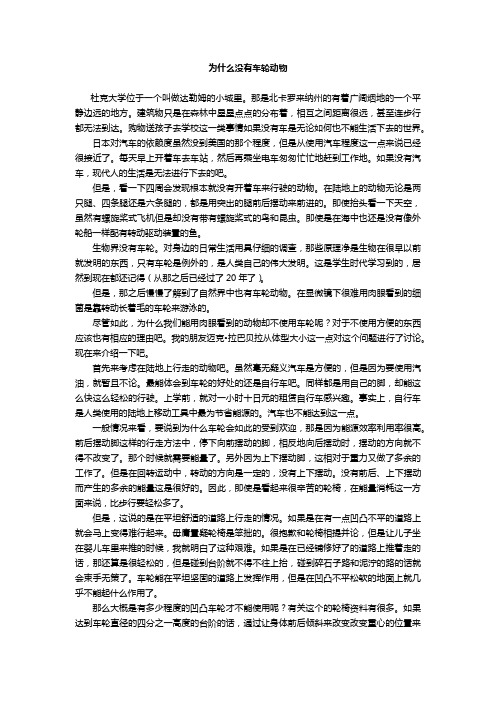
为什么没有车轮动物杜克大学位于一个叫做达勒姆的小城里。
那是北卡罗来纳州的有着广阔烟地的一个平静边远的地方。
建筑物只是在森林中星星点点的分布着,相互之间距离很远,甚至连步行都无法到达。
购物送孩子去学校这一类事情如果没有车是无论如何也不能生活下去的世界。
日本对汽车的依赖度虽然没到美国的那个程度,但是从使用汽车程度这一点来说已经很接近了。
每天早上开着车去车站,然后再乘坐电车匆匆忙忙地赶到工作地。
如果没有汽车,现代人的生活是无法进行下去的吧。
但是,看一下四周会发现根本就没有开着车来行驶的动物。
在陆地上的动物无论是两只腿、四条腿还是六条腿的,都是用突出的腿前后摆动来前进的。
即使抬头看一下天空,虽然有螺旋桨式飞机但是却没有带有螺旋桨式的鸟和昆虫。
即使是在海中也还是没有像外轮船一样配有转动驱动装置的鱼。
生物界没有车轮。
对身边的日常生活用具仔细的调查,那些原理净是生物在很早以前就发明的东西,只有车轮是例外的,是人类自己的伟大发明。
这是学生时代学习到的,居然到现在都还记得(从那之后已经过了20年了)。
但是,那之后慢慢了解到了自然界中也有车轮动物。
在显微镜下很难用肉眼看到的细菌是靠转动长着毛的车轮来游泳的。
尽管如此,为什么我们能用肉眼看到的动物却不使用车轮呢?对于不使用方便的东西应该也有相应的理由吧。
我的朋友迈克•拉巴贝拉从体型大小这一点对这个问题进行了讨论。
现在来介绍一下吧。
首先来考虑在陆地上行走的动物吧。
虽然毫无疑义汽车是方便的,但是因为要使用汽油,就暂且不论。
最能体会到车轮的好处的还是自行车吧。
同样都是用自己的脚,却能这么快这么轻松的行驶。
上学前,就对一小时十日元的租赁自行车感兴趣。
事实上,自行车是人类使用的陆地上移动工具中最为节省能源的。
汽车也不能达到这一点。
一般情况来看,要说到为什么车轮会如此的受到欢迎,那是因为能源效率利用率很高。
前后摆动脚这样的行走方法中,停下向前摆动的脚,相反地向后摆动时,摆动的方向就不得不改变了。
日语第五册第一课
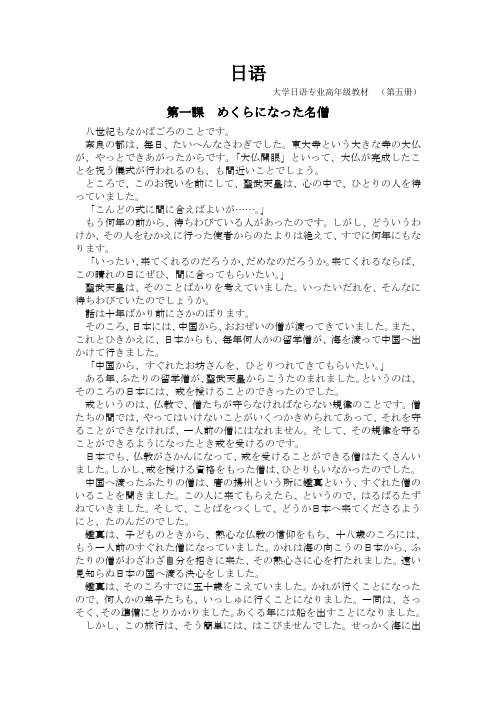
日语大学日语专业高年级教材(第五册)第一課めくらになった名僧八世紀もなかばごろのことです。
奈良の都は、毎日、たいへんなさわぎでした。
東大寺という大きな寺の大仏が、やっとできあがったからです。
「大仏開眼」といって、大仏が完成したことを祝う儀式が行われるのも、も間近いことでしょう。
ところで、このお祝いを前にして、聖武天皇は、心の中で、ひとりの人を待っていました。
「こんどの式に間に合えばよいが……。
」もう何年の前から、待ちわびている人があったのです。
しがし、どういうわけか、その人をむかえに行った使者からのたよりは絶えて、すでに何年にもなります。
「いったい、来てくれるのだろうか、だめなのだろうか。
来てくれるならば、この晴れの日にぜひ、間に合ってもらいたい。
」聖武天皇は、そのことばかりを考えていました。
いったいだれを、そんなに待ちわびていたのでしょうか。
話は十年ばかり前にさかのぼります。
そのころ、日本には、中国から、おおぜいの僧が渡ってきていました。
また、これとひきかえに、日本からも、毎年何人かの留学僧が、海を渡って中国へ出かけて行きました。
「中国から、すぐれたお坊さんを、ひとりつれてきてもらいたい。
」ある年、ふたりの留学僧が、聖武天皇からこうたのまれました。
というのは、そのころの日本には、戒を授けることのできったのでした。
戒というのは、仏教で、僧たちが守らなければならない規律のことです。
僧たちの間では、やってはいけないことがいくつかきめられてあって、それを守ることができなければ、一人前の僧にはなれません。
そして、その規律を守ることができるようになったとき戒を受けるのです。
日本でも、仏教がさかんになって、戒を受けることができる僧はたくさんいました。
しかし、戒を授ける資格をもった僧は、ひとりもいなかったのでした。
中国へ渡ったふたりの僧は、唐の揚州という所に鑑真という、すぐれた僧のいることを聞きました。
この人に来てもらえたら、というので、はるばるたずねていきました。
- 1、下载文档前请自行甄别文档内容的完整性,平台不提供额外的编辑、内容补充、找答案等附加服务。
- 2、"仅部分预览"的文档,不可在线预览部分如存在完整性等问题,可反馈申请退款(可完整预览的文档不适用该条件!)。
- 3、如文档侵犯您的权益,请联系客服反馈,我们会尽快为您处理(人工客服工作时间:9:00-18:30)。
第五册课文翻译第一课失明的高僧公元8世纪中叶。
首都奈良,这里每天热闹非凡。
东大寺这座大寺院修建的大佛终于完工。
离庆祝大佛竣工的仪式——大佛开光的日子越来越近了。
但是,庆典将至,圣武天皇正期待着一个人的到来。
“但愿他能赶上这次庆典!”这个人,圣武天皇几年前就一直翘首期盼他的到来。
但是,不知什么原因,派去迎接她的是这几年来都杳无音讯。
“他到底会不会来?能来的话,一定要赶上这个盛大的日子啊!”圣武天皇心里总惦记着这件事。
到底是谁让天皇等得如此心焦呢?故事还得从十年前说起。
那时候,中国有很多僧人东渡日本。
同样,日本每年也有一些留学僧飘洋过海到中国去。
“我希望你们能从中国带回一位高僧。
”有一年,圣武天皇委以两名留学僧这样的重托。
因为当时的日本还没有一个够资格为众僧授戒的高僧,天皇希望能从中国请到一位这样的人。
所谓戒,就是在佛教中僧人必须遵守的戒律,修行的僧人,有一些事情是禁止做的。
如果不严格遵守戒律,就不能成为一名合格的僧人。
能够遵守这些戒律的僧人才可以受戒。
佛教在日本很盛行。
有很多僧人已经具备受戒的条件,但是有资格给他们授戒的高僧却一个也没有。
来到中国的两位日本僧人,听说唐朝的扬州有一位名叫鉴真的高僧。
要是能请到这位高僧就好了,带着这样的想法,他们跋山涉水、不顾路途遥远前去拜访鉴真,言辞恳切地请求鉴真去日本。
鉴真从孩提时就诚心信佛,18岁时,已经成为一名优秀的僧人。
他看到这两位僧人不远万里,专程从隔海相望的日本前来邀请自己,被这份热诚深深打动,于是,决定东渡日本,前往那个遥远而陌生的国度。
当时鉴真已经50多岁。
因为他要去日本,所以几个弟子也要陪同前往。
他们马上动手做准备,第二年便扬帆起航,东渡日本。
但是,这次航行并非一帆风顺。
他们的船好不容易扬帆起航,不料途中遇上了狂风巨浪,幸好获救,才得以死里逃生!可刚一回到岸上,他们马上又开始张罗船只,为下一次出航做准备。
很快,一切准备就绪,他们再次出航,不料这次却又遭遇海盗打劫,被掳去很多重要物品,无奈之下只好无功而返。
麻烦还不止这些,妒忌鉴真东渡的人也开始百般阻挠。
由于接二连三的失败,一些人失去了东渡日本的信心,他们认为不应该继续这种无意义的旅行。
同时因为困难太多,东渡日本的一行人内部也开始出现分裂、争吵,还出现了一些只顾个人利益的人。
即使是在这种时候,坚贞也毫不退缩,他默默承受着一切,不管任何时候脸上都带着微笑。
只要看到他的微笑,大家的内心就会受到激励,重新鼓起继续东渡的勇气。
东渡日本屡遭挫折。
真可谓“祸不单行”。
不久,从日本前来迎接鉴真的两位僧人中有一位因身染重病不治,最终死在旅途中。
正当鉴真为失去这样一位重要人物悲痛不已的时候,像是要追随日本僧人似的,鉴真的大弟子也随之离开了人世。
两位得意弟子的去世,对鉴真无疑是一个沉痛的打击。
由于年事已高,加上长期奔波劳顿,鉴真的身体日渐衰弱。
这时,巨大的不幸也降临到了鉴真的头上。
有一天,一名弟子看到鉴真用手悉悉索索地摸索着什么,这时他大吃一惊:鉴真的眼睛看不到东西了!长期的劳累导致这位年迈的高僧双目失明了。
即使这样,鉴真也没有忘记微笑,而且也没有动摇东渡日本的决心。
一想到自己赴日的使命,鉴真心里便燃起希望的火种,失明的双眼也仿佛放射着光芒。
连续经历五次失败之后,第六次,鉴真终于来到了日本。
他这次乘坐的是遣唐使返回日本的船只。
在九州登陆后,顺利地到达了奈良。
此次东瀛之行,从计划到成功,总共花费了11年的时间。
在奈良,得知来了一位唐朝著名的高僧,从天皇到众僧无不欣喜万分。
这时,距大佛开光的庆典已经过去了两年。
这位历经千辛万苦,即使失明也不改初衷、远渡重洋来到日本弘扬佛法的高僧受到人们隆重的欢迎。
翌年,在东大寺前,失明的鉴真首次为天皇以及500多名僧人授戒。
鉴真授戒的地方叫戒律院,至今仍保存在东大寺内。
后来,日本朝廷赏赐给鉴真大片的土地,他在上面建起了一座宏伟的寺院,为众人讲经传法。
从此鉴真再没有回到大唐故国。
10年后,他在那座寺院圆寂,据说享年77岁。
那座寺院就是今天奈良南部的唐招提寺。
嫩叶手中持,欲拭君之泪。
这是江户时代的俳句家芭蕉瞻仰鉴真塑像后写下的俳句。
意思是:我真想用柔软晶莹的嫩叶,为失明的鉴真拭去眼中的泪水。
他经历了多少苦难啊!鉴真的塑像据说为天平时期的杰作。
这位品格高尚的一代名僧,他的音容笑貌,至今仍然打动着每一位瞻仰者的心。
第二课把生死置之度外距今约60年前,即明治二十八年(1895年)八月。
在富士山顶的剑锋上,令人不可置信地建有一间小屋。
这是一间木制平房。
南北长约5.5米,东西宽约3.5米,高约3米。
屋顶上,伸出几根蜗牛角似的木棒。
小屋上方的岩石上,一个木碗状的东西滴溜溜地在转动。
为了抵御冬天的严寒,房屋四周已经用石头严严实实地围了起来。
“和田老师,多亏了您的帮忙,终于完工了。
”当时还很年轻的野中到高兴地说着,脸上兴奋得泛着红晕。
“是啊!终于完工了。
日本终于有了高山气象观测站,这全归功于野中君啊!”答话的是中央气象台的天气预报科科长和田雄治工程师。
“哪里哪里,都是老师您的功劳。
”在此之前,日本国内还没有一个高山气象观测站。
而在国外,从阿尔卑斯山的勃朗峰到南美的米斯蒂火山,很早以前就有观测站,能够详细的收集到全年的气象情报。
如果不了解高空的气象,就不能为诸如渔业、农业、交通等重要行业提供准确的天气预报。
野中到23岁那年才开始明白气象观测的重要性。
他决心无论如何也要在日本建立高山气象观测站。
于是,他找到和田工程师,开始向他学习气象学的知识。
7年后的今天,野中到终于在富士山顶上建起了这个私人观测站,在和田工程师的指导下配备了必需的仪器。
有关气象观测的方法,和田工程师也给了很多指点。
“就在这里好好干一个冬天吧!”实现了多年的愿望,野中到感到无比欢欣鼓舞。
他把妻子千代子和3岁的长女留在东京,在明治二十八年九月三十日这一天,独自一人上了这个私人观测站,随即在第二天,即十月一日,开始日本第一次高山气象观测。
这个消息传出后,使人目瞪口呆,觉得不可思议。
“在富士山顶上过冬?简直是找死,野中到肯定是疯了!”的确,在那个时候,冬天登富士山是想都不敢想的事。
一到冬天,山顶和山脚就变成两个截然不同的世界。
生病的话,别说找医生,就连倒杯水的人都没有。
一想到那些万一发生的事,和田工程师和气象站所有人都替野中到担心,同时也祝愿他所热爱的事业能获得成功。
万里晴空的十月,从富士山顶极目远眺,满眼尽是瑰丽的景色。
北面是碧波荡漾的富士五湖,南面是层峦迭嶂的伊豆山,山麓的绵延处,静浦、三保松原、清水港等尽收眼底。
眼前的美景,日阿明合谷机的野中到感到心旷神怡。
但是,十月一过,山上就进入严寒的冬季,开始下雪了。
大概过了半个月,突然有一天,妻子千代子在脚夫的搀扶下爬到山顶上来了。
野中到大吃一惊:“你来这里干什么?”“来帮忙呀!”“孩子呢?”“已经托付给九州的娘家了。
”“是吗?但是,这里不是女人待的地方,快回去吧!”“不,我来给你当助手,我多少能帮上点忙吧?”千代子是下定决心要给忘我的丈夫助一臂之力,才上山来的!就这样,两人开始了高山生活。
野中到一个人工作的时候,每隔两小时就要进行一次观测并整理观测到的数据,每天重复十二次,还要自己解决吃饭问题,忙得不可开交。
自从妻子来了以后,不但不用他做饭,妻子还尽心尽力的帮他做气象观测记录。
“两个人工作的确比一个人要快,你来真是帮大忙了!”野中到从心底里感谢妻子。
就这样,观测工作顺利地进行了一个月。
但是,一进入十一月,山顶上每天疾风呼啸,飞雪狂舞。
小屋被积雪埋没,气温从零下8度、9度、10度不停地往下降。
十一月中旬,千代子患上扁桃腺炎,高烧40度。
好不容易病情有了转机,刚刚松一口气,全身有浮肿起来。
这是因为空气稀薄,得了高山病。
在这样的情况下,根本无法就医。
“可怜的千代子,下一个该轮到我了。
但是,就算是倒下,我也要坚持工作。
”野中到一边照顾着病中的妻子,一边继续进行观测。
十二月,妻子的病日渐好转,慢慢恢复了健康。
“谢天谢地,工作又可以正常进行了。
”野中到终于松了一口气。
不料,妻子刚刚痊愈,野中到却病倒了。
他全身浮肿,还伴有高烧。
“没有什么大不了的,别担心!和你一样,过几天就会没事了。
”虽然野中到心里这么想,但病情一天比一天严重。
他们没有意识到,这是由于缺乏蔬菜而得了严重的脚气病。
后来,野中到连行走都困难,无法下咽食物,甚至连喘一口气都很费劲。
“岂有此理,这点病能难倒我吗?工作要紧,无论如何我也要坚持到明年春天。
”一到时间野中到仍然挣扎着从床上爬起来,扶着墙壁气喘吁吁地向小屋尽头的观测室挪去。
“让我来做,你好好躺着吧!”千代子已经学会做一些观测工作了。
可是不管她怎么央求,野中到也不听。
“只要我还能动,就得由我来做!”野中到顽强地与死亡的威胁作斗争,他走到暴风雪肆虐的户外,测量风速、风向、湿度、气温、气压以及积雪量。
他顶着暴风雪不停地计算、记录,头发蓬乱、胡子拉碴、脸部浮肿,简直像一个野人,可唯独那双眼睛依然炯炯有神。
屋外,暴风雪不分昼夜地咆哮。
立在岩石上的风力计被冻住了好几回,转不起来了。
野中到拖着虚弱的身体爬上岩石,用斧头敲掉柱子上的结冰,顺便排除了风力计的故障。
物资虽然有暖炉,但不管丢进多少柴火,室内还是像冰窖一样寒冷。
飞雪从门缝挂近来,连窗上都积了一层厚厚的雪。
观测室里没有一丝暖意,垂悬的冰柱粗达直径30厘米。
野中到不仅患有脚气病,还被严重的冻伤,而且病情不断的恶化。
与此同时,观测仪器也逐个开始出现故障。
先是风速计、风向计,后来干湿球湿度计也不管用了。
“唉,要是有仪器更换就好了。
不能等到明年啊!”野中到看到损坏的仪器叹息道。
他完全忘记了自己的病情。
十二月二十二日这一天,雪停了,狂风还在呼啸。
忽听风中传来人们的呼叫声。
千代子对躺在床上的野中到说:“你听!人在说话,有人上山来了。
”“他们在喊什么?”野中到也听见了。
“野中先生!野中先生!”很快就听见门外有人叫喊。
“我们在这里!”千代子大声应道。
可是,门已经被冰雪封住,不光从里面还是外面都无法打开。
“算了,砸开一个地方进去吧!”外面人在商量。
不一会儿,屋顶被砸开一个洞。
最先跳下来的人是中央气象台的和田工程师,接着是警察署长和几个脚夫。
“野中君,你还好吧?”和田工程师冲过来握住野中到的手。
“因为放心不下,所以上来看看你的工作情况。
野中君,你的身体不行了,马上下山吧!”“老师,我不下山,病好得差不多了。
”“不行,你这样会把命丢了的。
听我的,下山去!”“不,老师,如果我不坚持到明年春天,就这样下山的话,只能说明没有人可以在富士山过冬这一事实。
这样的话,日本什么时候才能在富士山上建起气象观测站呀?让我继续留在这里吧!”野中到流着泪向和田工程师恳求道。
“野中君,不能这么说。
你已经证明在富士山顶是可以过冬的了。
这84天来,你不一直都在这零下二三十度的山顶观测气象吗?我们确信只要有更完备的设备、研制出更合适的高山的食品,那我们全年都可以在富士山顶进行气象观测。
